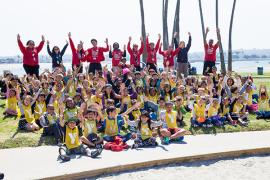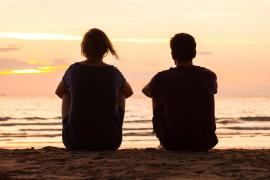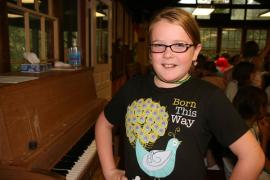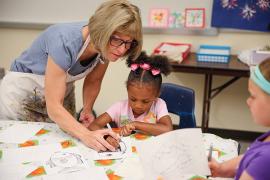Chaco interviews Jessica Weissbuch, cofounder and executive director of Brave Trails, a nonprofit organization dedicated to LGBTQ+ youth leadership.
It was 2015, and Camp Brave Trails just launched their first summer camp program. They welcomed 43 teens to camp that year. The following year, it grew to 96. Today, they serve hundreds of LGBTQ+ youth through a variety of year-round programming. Chaco sat down with Brave Trails cofounder and executive director Jessica Weissbuch and talked about the organization’s origin, what a typical day at summer camp looks like, and how they create a safe and empowering space for LGBTQ+ youth. In this blog, we’ll highlight a few ways Brave Trails creates an inclusive and safe space for LGTBQ youth that can help to inspire and guide you on how to make summer camp a welcoming place for all.
Intentional Programming
Camp Brave Trails is structured similar to a lot of traditional camp programs, but with more unicorn dust and emphasis on building leadership. They note on their website, “We like to describe Camp Brave Trails as a mix between traditional summer camp and a leadership institute, with an LGBTQ twist! What does that mean? Well, when we designed Camp Brave Trails, we took all of our favorite aspects of summer camp and tweaked them to work better for LGBTQ youth!”
Weissbuch shared what a typical day at camp looks like, and it was nothing short of magical. It’s clear that their thoughtful program design, focus on leadership, and clear intention fosters a sense of safety and inclusion that their campers may not feel in spaces outside of camp.
Weissbuch: “When our campers wake up in the morning, instead of doing a typical “round-up” or going straight into programming, we meet at our flagpole and raise a different identity flag each day. Our CIT [counselors in training] team or better known as “The Unicorn Justice League” (they named themselves that the first year) picks out a flag, raises it, says a few words about it, and then we have a moment of silence and reflection. After that, we open the floor for all campers to tell their story in conjunction with the identity flag. We do that every single morning.
After breakfast, and our “build-on” programming — where campers get to pick a skill they want to learn or improve on throughout their camp session — they transition into our leadership workshops. These are intentional leadership spaces and look like a variety of different things. There can be leadership in any subject. For example, we've had campers come in and choose “mindfulness juggling” so they can learn that skill, but they do it with a purpose. And that could be for mindfulness, anxiety relief, depression relief, and/or to help ground them. For us that's considered leadership because you can't be a leader in your community unless you yourself are grounded. There are other examples of workshops more focused on hard skills like public speaking, queer sex education, or picking out a queer friendly college. Things like that that our kids need and aren’t getting elsewhere. And so really, our intention with these workshops is that they can go back to their community and actually use them.
This summer, we tested a new program called “Trailblazing Troops.” It's basically a group where they can bring to the table whatever they want to talk about. It could be, you know, “Dungeons and Dragons” for example, it could be about gender, it could be about identity, or sexuality, it could be about being POC in a camp space. It could be all of those things and it could just be quiet time. It could be reading a book, or it could be everybody watching a show and discussing it afterwards. It’s important that we create these spaces for our campers, especially to have those conversations around identity and sexuality.”
Gender Neutral Spaces
Camp Brave Trails also fosters a welcoming environment by having gender neutral spaces.
“We have gender neutral bathrooms and showers,” Weissbuch says. “Things like that are really easy in my mind to alter and adjust. I know there are a lot of camps now that are popping up with gender neutral cabins and bathrooms. We bunk everybody by age, literally by birthday and it's awesome.”
Weissbuch also notes, “Many industries, but especially the camping industry is all about tradition — it’s like, it's always been this way. So at Camp Brave Trails, we’re going to totally rock the boat and try to do something a little different.”
Access to Mental Health Support
In 2021, Brave Trails launched a fully comprehensive mental health program. These services are an extension of the programs Brave Trails offers year-round. Weissbuch shared, “Brave Trails is definitely a camp, but we’re also a nonprofit. Our camp is not a therapy camp, but it is therapeutic. Unfortunately, with our demographic of queer youth, the need is pretty high and we're always there to support in that way. We saw the need for year-round mental health support and so we launched last year. We're just starting our second cohort in a few weeks actually, it's a cohort of five therapists that are pre-licensed, and they go through a yearlong training on queer youth therapy.”
Services of this program; Individual Therapy for LGBTQ Youth, a Youth Support Group, and Parent Support Group. To learn more about these services, visit bravetrails.org/mental-health-program .
To read the full interview between Chaco and Brave Trails go to blogchacos.wordpress.com
Learn more about Brave Trails by vising bravetrails.org/. You can find them on Instagram, Tik Tok, and Facebook by searching “Brave Trails'.'
The views and opinions expressed by contributors are their own and do not necessarily reflect the views of the American Camp Association or ACA employees.




